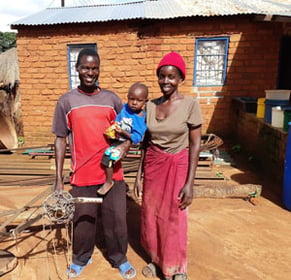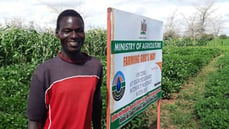 |
| Taulo & Rosemary in front of their new home |
Taulo Banda, 42, proudly showed me the electricity cable that taps power from the national grid to his house. “A few years ago, I would never have believed that one day I would live in a house like this one,” says Taulo, adding, “But, thanks to World Vision, I have achieved the impossible.” The new house is made of brick with a metal roof and windowpanes. Behind him, stands his old homestead. It is composed of two round grass-thatched structures. The sharp contrast between the old and new houses illustrates the transformation that has taken place in Taulo’s life.
Taulo is a farmer in Mthanzi village in Katete, Eastern Zambia. He is married to Rosemary Miti, 38, and they have four children. Just like many small-scale farmers in Zambia, Taulo’s farm only yielded enough for domestic consumption. Often, the yield was not even enough to last till the next harvest. “Towards the end of the year, we would run out of food,” recalls Taulo.
Taulo’s life changed when he attended World Vision’s Empowered Worldview Training. “I realized that I could do farming as a business and not just for food,” says Taulo. In addition to the Empowered Worldview training, THRIVE (Transforming Household Resilience in Vulnerable Environments) equips farmers with better farming methods that conserve the soil and increase yield. World Vision Zambia seeks to improve the livelihoods of smallholder farmers by helping them increase and diversify their income to build resilience against climate change, markets, and physical emergencies and shocks. Taulo put his training to good use a few years ago. “We had a drought, but because of the conservation farming method, my field remained moist, and I was able to have a good harvest,” says Taulo. He adds, “But many people could not harvest even a bag of corn.” As a result of the corn shortage, prices went up and those who had corn made a lot of money.
 |
| Taulo stands in front of the Farming God’s Way field |
Better farming methods have increased Taulo’s yield significantly. Before the THRIVE training his income was $150 annually, but now he makes $1,700. Furthermore, Taulo received training in financial literacy and joined a saving group. “Now I do not have to worry about where to get money for farm inputs and school fees for my children because I use money from the share-out,” says Taulo. By making monthly contributions, members of the group create capital for diverse businesses. The members may borrow money at 10% interest. At the end of the year, they have a share-out where they share the profit from the interest, as well as the contributions. Taulo’s wife, Rosemary, also joined the group and started selling fish in the community.
Taulo has diversified his crops and grows soya beans, sunflower, and cotton in addition to corn. He also started a farmer field school where he trains other farmers to use better farming methods. With access to electricity, Taulo plans to start a business of making metal door and window frames, and other related products. The future looks very bright for Taulo’s children.







